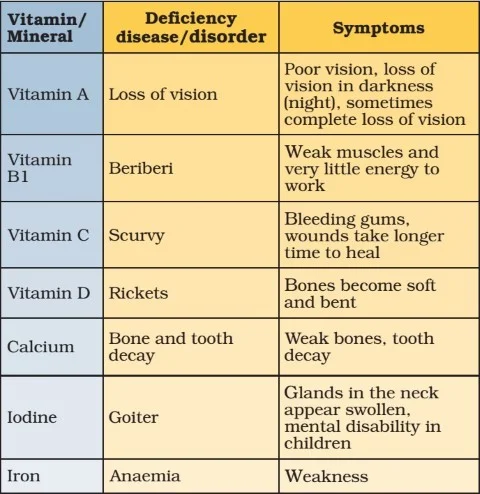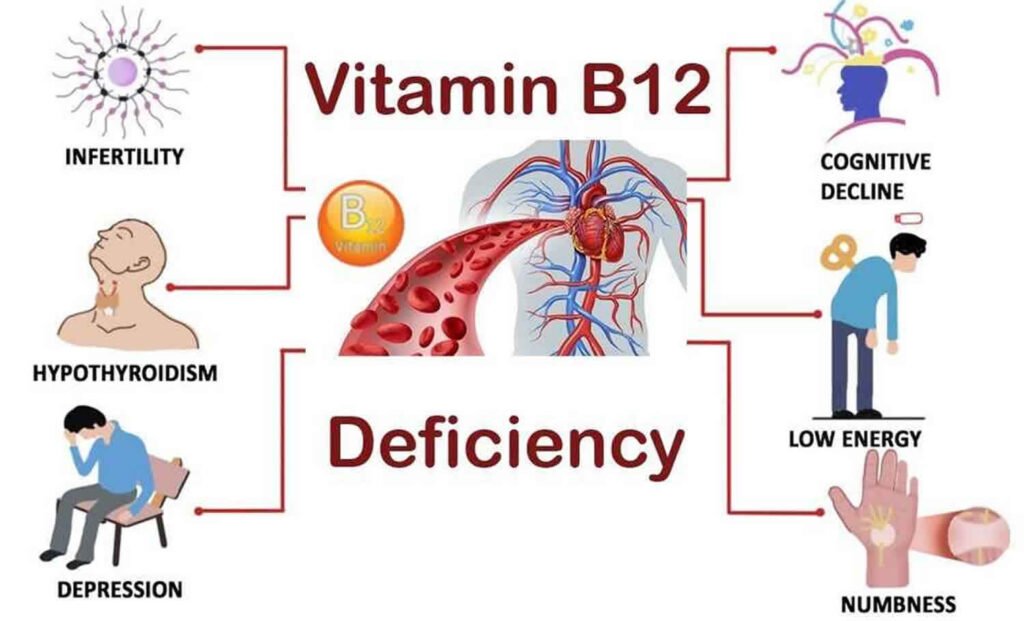Vitamins are organic compounds essential in small quantities for various bodily functions. Although they don’t produce energy on their own, they function as coenzymes or cofactors, assisting enzymes in a variety of bodily chemical activities. This is a thorough explanation of their roles, classification, and the effects of deficiency.
Table of Contents
Classification of Vitamins
Vitamins are classified into two main groups based on their solubility:
- Fat-Soluble Vitamins: These vitamin can dissolve in fat and are stored in the body’s fatty tissues. They include:
- Vitamin A: Essential for vision, immune function, and cell growth.
- Vitamin D: Promotes calcium absorption for bone health and plays a role in cell growth and immune function.
- Vitamin E: Acts as an antioxidant, protecting cells from damage, and supports immune function.
- Vitamin K: Crucial for blood clotting and bone health.
- Water-Soluble Vitamins: These vitamin dissolve readily in water and are not stored in the body to a significant extent. They need to be consumed regularly through diet. Examples include:
- Vitamin C: A potent antioxidant supporting immune function, collagen production, and wound healing.
- B Vitamins (B1, B2, B3, B6, B12, Biotin, Folic Acid): Play a vital role in energy metabolism, nervous system function, red blood cell formation, and DNA synthesis.

Within each group, there are further subcategories with specific functions.
Functions of Vitamins
Vitamins have diverse and essential functions in the body:
- Energy Production: B vitamin play a crucial role in converting food into usable energy.
- Metabolism: Many vitamin are involved in various metabolic processes, ensuring the smooth functioning of the body’s chemical reactions.
- Immune System Function: Vitamins A, C, E, and B vitamin contribute to a healthy immune system and help fight off infections.
- Vision: Vitamin A is essential for maintaining healthy vision, especially night vision.
- Bone Health: Vitamin D and vitamin K promote calcium absorption and contribute to strong bones.
- Cell Growth and Repair: Vitamin A, B vitamin, and vitamin C are involved in cell growth, repair, and DNA synthesis.
- Antioxidant Activity: Vitamins C and E act as antioxidants, protecting cells from damage caused by free radicals.
- Nervous System Function: B vitamin are crucial for healthy nervous system function and neurotransmitter production.
- Red Blood Cell Formation: Vitamin B12 and folic acid are essential for the production of red blood cells, which carry oxygen throughout the body.
Deficiency of Vitamins
A deficiency in any vitamin can lead to various health problems depending on the specific vitamin and the severity of the deficiency. Here are some examples:
- Vitamin A Deficiency: Can cause night blindness, dry eyes, and impaired immune function.
- Vitamin D Deficiency: Can lead to rickets in children (causing soft bones) and increased risk of osteoporosis in adults.
- Vitamin E Deficiency: Rare, but can cause neurological problems and muscle weakness.
- Vitamin K Deficiency: Can lead to impaired blood clotting and increased risk of bleeding.
- Vitamin C Deficiency: Can cause scurvy, characterized by fatigue, weakness, bleeding gums, and poor wound healing.
- B Vitamin Deficiencies: Depending on the specific B vitamin, deficiencies can cause fatigue, anemia, nerve damage, dermatitis (skin problems), and cognitive decline.

Vitamin deficiencies can arise from a number of causes, such as insufficient food consumption, certain medical disorders that interfere with absorption, and higher requirements during pregnancy or lactation.
Maintaining Vitamin Balance
To ensure you get the essential vitamins your body needs, you can follow these tips:
- Eat a balanced diet: Include a variety of fruits, vegetables, whole grains, legumes, nuts, seeds, and lean protein sources in your diet. Each food group provides a different range of vitamin.
- Consider fortified foods: Certain foods, such milk fortified with vitamin D or cereals fortified with B vitamin, are enhanced with particular vitamin. These can be useful solutions, particularly if diet isn’t enough to suit your demands.
- Consult a healthcare professional: If you have concerns about vitamin deficiencies, they can advise you on dietary modifications or recommend supplements if necessary.
By understanding the classification, functions, and deficiency systems of vitamin, you can strive for a well-rounded diet to ensure your body has the necessary spark plugs to keep its vital functions running smoothly.
Frequently Asked Questions (FAQs)
What are the functions of vitamins?
Vitamins and minerals are essential for bodily functions such as helping to fight infection, wound healing, making our bones strong and regulating hormones. Vitamin and minerals can cause toxicity if consumed in large amounts.
What are the most deficient vitamins?
4 Most Common Vitamin Deficiencies. The four most common vitamin deficiencies include vitamin D, B6 and B12, and folic acid.
What is 12 vitamin deficiency?
Vitamin B12 deficiency happens when your body is either not getting enough or not absorbing enough vitamin B12 from the food that you eat that it needs to function properly.
Related Articles

